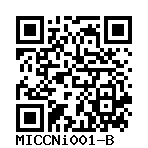ADHD Stem Cell Study_subject 6, hiPSC_03 family control sibling, clone C2
MICCNi001-B
General
Cell Line |
|
| hPSCreg name | MICCNi001-B |
| Cite as: | MICCNi001-B (RRID:CVCL_UM14) |
| Alternative name(s) |
ADHD Stem Cell Study_subject 6, hiPSC_03 family control sibling, clone C2
|
| Cell line type | Human induced pluripotent stem cell (hiPSC) |
| Similar lines |
MICCNi001-A (ADHD Stem Cell Study_subject 6, hiPSC_03 family control sibling, clone C1) |
| Last update | 22nd May 2019 |
| User feedback | |
Provider |
|
| Generator | Monash Institute of Cognitive and Clinical Neurosciences (MICCN) |
External Databases |
|
| BioSamples | SAMEA4984141 |
| Cellosaurus | CVCL_UM14 |
| Wikidata | Q95989694 |
General Information |
|
| Publications | |
| * Is the cell line readily obtainable for third parties? |
Yes Research use: allowed
Clinical use: not allowed
Commercial use: not allowed
|
Donor Information
General Donor Information |
|
| Sex | male |
| Ethnicity | Caucasian |
Phenotype and Disease related information (Donor) |
|
| Diseases | No disease was diagnosed.
|
Other Genotyping (Donor) |
|
| Is there genome-wide genotyping or functional data available? |
No
|
Donor Relations |
|
| Other cell lines of this donor | |
External Databases (Donor) |
|
| BioSamples | SAMEA4984139 |
Ethics
| Has informed consent been obtained from the donor of the embryo/tissue from which the pluripotent stem cells have been derived? | Yes |
| Was the consent voluntarily given? | Yes |
| Has the donor been informed that participation will not directly influence their personal treatment? | Yes |
| Can you provide us with a copy of the Donor Information Sheet provided to the donor? | Yes |
| Do you (Depositor/Provider) hold the original Donor Consent Form? | No |
| If you do not hold the Donor Consent Form, do you know who does? | No |
| Alternatives to consent | |
| Alternative consent approval number | |
| Please indicate whether the data associated with the donated material has been pseudonymised or anonymised. | pseudonymised |
| Does consent explicitly allow the derivation of pluripotent stem cells? | Yes |
| * Does consent expressly prevent the derivation of pluripotent stem cells? | No |
| Details on restriction to research project | |
| Does consent prevent CELLS DERIVED FROM THE DONATED BIOSAMPLE from being made available to researchers anywhere in the world? | Yes |
| How may genetic information associated with the cell line be accessed? | Controlled Access |
| Will the donor expect to receive financial benefit, beyond reasonable expenses, in return for donating the biosample? | No |
| Please describe how access is provided: | |
| Contact data, institution, or website: | |
| Has a favourable opinion been obtained from a research ethics committee, or other ethics review panel, in relation to the Research Protocol including the consent provisions? | Yes |
| Name of accrediting authority involved? | Monash University Human Research Ethics Committee |
| Approval number | CF15/2566 - 2015001048 |
| Has a favourable opinion been obtained from a research ethics committee, or other ethics review panel, in relation to the PROPOSED PROJECT, involving use of donated embryo/tissue or derived cells? | No |
| Name of accrediting authority involved? | |
| Approval number | |
| Please describe: | |
| Further constraints on use | |
| For generation of the cell line, who was the supplier of any recombined DNA vectors or commercial kits used? | |
| Constraints for use or distribution |
hIPSC Derivation
General |
|
| Source cell type |
A leukocyte with a single non-segmented nucleus in the mature form found in the circulatory pool of blood.
|
| Source cell origin |
A fluid that is composed of blood plasma and erythrocytes.
Synonyms
|
Reprogramming method |
|
| Vector type | Non-integrating |
| Vector | Sendai virus |
| Genes | |
| Is reprogramming vector detectable? |
No |
| Methods used |
RT-PCR
|
Vector free reprogramming |
|
Other |
|
| Derived under xeno-free conditions |
Unknown |
| Derived under GMP? |
Unknown |
| Available as clinical grade? |
Unknown |
Culture Conditions
| Medium |
Essential 8™
|
Characterisation
Analysis of Undifferentiated Cells
| Marker | Expressed | Immunostaining | RT-PCR | Flow Cytometry | Enzymatic Assay | Expression Profiles |
| TRA 1-60 |
Yes |
|
||||
| NANOG |
Yes |
|
||||
| Klf4 |
Yes |
|
||||
| POU5F1 (OCT-4) |
Yes |
|
Self-renewal
Unknown
Endoderm
Unknown
Mesoderm
Unknown
Ectoderm score
Positive
Differentiation Potency
Genotyping
Karyotyping (Cell Line) |
|
| Has the cell line karyotype been analysed? |
Yes
46,XY
Karyotyping method:
G-Banding
|
Other Genotyping (Cell Line) |
|


Login to share your feedback, experiences or results with the research community.